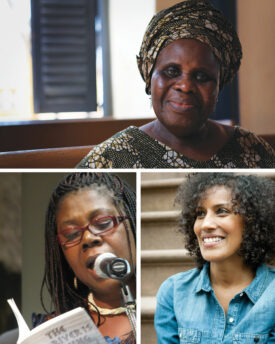Matthew Shenoda Reads Seven African Women Poets
 APBF Editorial Board member Matthew Shenoda recently published a piece entitled “Verse Africa: The Malleable Poetics of Some Contemporary African Poets,” in World Literature Today. The essay discusses the founding of the APBF, with the goal of broadening the audience for contemporary African poetry in English.“We have ever so slightly changed the face of contemporary anglophone poetry,” Shenoda writes. “We have complicated the landscape of contemporary American poetry, given rise to the way American and other readers have access to African poetics, and have created viable and rich transatlantic communities of poets that have begun a deeply nuanced and engaged conversation with one another and with their literary siblings the world over.”
APBF Editorial Board member Matthew Shenoda recently published a piece entitled “Verse Africa: The Malleable Poetics of Some Contemporary African Poets,” in World Literature Today. The essay discusses the founding of the APBF, with the goal of broadening the audience for contemporary African poetry in English.“We have ever so slightly changed the face of contemporary anglophone poetry,” Shenoda writes. “We have complicated the landscape of contemporary American poetry, given rise to the way American and other readers have access to African poetics, and have created viable and rich transatlantic communities of poets that have begun a deeply nuanced and engaged conversation with one another and with their literary siblings the world over.”
Shenoda considers, too, the impact this initiative has already had on the global face of African poetry–particularly in poetry written by women:
“We have specifically seen the cultivation of the female voice as an unquestionable barometer of the health and vibrancy of these poetic traditions.”
Shenoda examines the work of seven contemporary women African poets, including his fellow Editorial Board member Aracelis Girmay, whose latest book, the black maria (BOA Editions), was a “Best Book of 2016” for The New Yorker, the Boston Globe, the Chicago Review of Books, and Publishers Weekly, among other honors. Shenoda also considers works by six writers the APBF has been fortunate to publish, including the famous Ghanaian writer Ama Ata Aidoo, whose new and selected poems appear in After the Ceremonies (edited and with a foreword by Helen Yitah) and the respected Liberian poet Patricia Jabbeh Wesley, author of When the Wanderers Come Home; Ladan Osman (Somalia), author of The Kitchen-Dweller’s Testimony, winner of the 2013 Sillerman Book Prize; Safia Elhillo (Sudan), author of The January Children, winner of the 2015 Sillerman Book Prize; Mahtem Shiferraw (Eritrea and Ethiopia), author of Fuchsia, winner of the 2014 Sillerman Book Prize.
Read the full article at World Literature Today:
